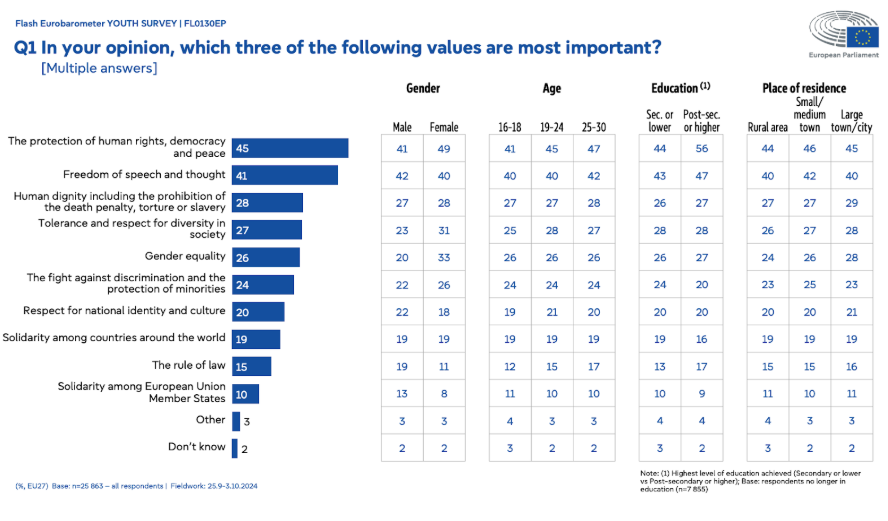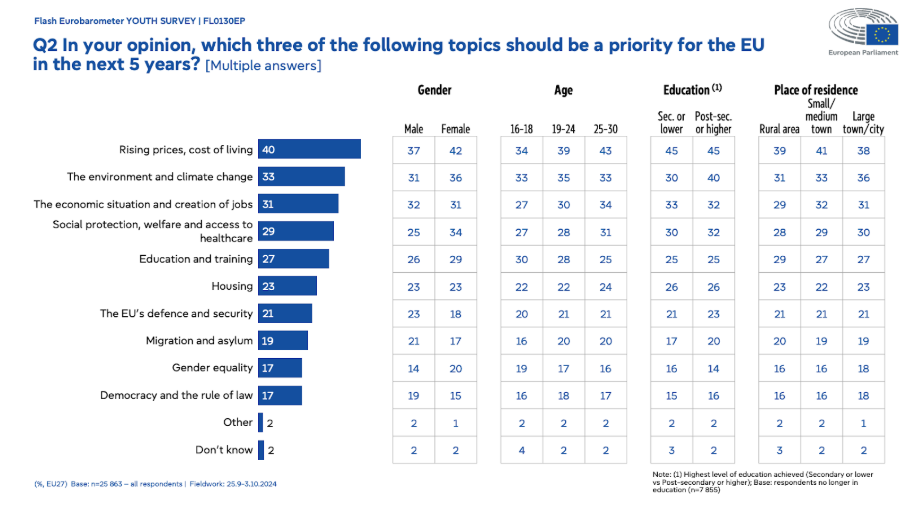 © Photo by Kaboompics.com from Pexels 2021
© Photo by Kaboompics.com from Pexels 2021
Political differences in Europe, what do young people really care about?
Utolsó frissítés kedd, 25/03/2025
2024-25 has been a very politically charged year, bringing all kinds of social, economic, and environmental concerns to the forefront. Especially during a rocky few months of local and national elections throughout 2024 and into 2025, young Europeans are coming face-to-face with the realities of their futures. The rift between political ideologies of young people grows bigger and bigger yet, despite a diverse range of political concerns, some common themes emerge across different countries.
What do young people in Europe really care about? The European Parliament Barometer Youth Survey of 2024 reveals key findings relevant to issues at the hearts of European Youth.
- Climate change & environmental policies
Climate change is one of the most pressing political issues for many young Europeans with 33% wishing to see this area prioritised in the EU for the next five years. Yet, perspectives on its urgency and importance vary depending on factors like geographic location, economic background, and political ideology.
Many young Europeans have witnessed extreme weather events, such as heatwaves, wildfires (in countries like Greece, Spain, and Portugal), and extreme flooding (ex. Germany and Belgium). These events create a sense of urgency and a demand for stronger climate policies as not only are lives at risk but the financial consequences to rebuild homes and infrastructure are very high. Additionally, many young people see green energy and sustainability as the future of job creation and economic stability. They push for government investment in renewable energy and sustainable industries.
Although some people would argue that there are bigger concerns than climate change and the environment. In regions with high youth unemployment (such as parts of Southern Europe), young people may prioritise economic security over climate action. They may see climate change as exaggerated or a distraction from other issues. While climate change is a long-term issue, some young people do not feel its direct, present impact in their daily lives.
- Social Justice & Human Rights
Social justice and human rights are the most important political concerns for many young Europeans with 45% of respondents in support of this value. Although opinions vary widely depending on cultural background, political ideology, and personal experiences. Issues like gender equality, tolerance and respect of diversity, freedom of speech and thought, and refugee policies are central to political discussions, yet not all young Europeans prioritise them equally.
This topic may seem less concerning to some as some young people believe that social justice movements have gone too far, leading to excessive political correctness and restrictions on free speech. In relation to humanitarian crises, they may feel as though it shouldn’t be the concern of their country to participate in involvement and support externally. As with climate change, for some young people, there still are even bigger concerns that should be addressed before progressive social justice and human rights policies.
- Economic Opportunities & Fair Wages
Economic stability is a major concern for young people across Europe at 31%, as they face challenges like high youth unemployment, rising living costs, and job insecurity. However, the level of concern varies depending on a country’s economic situation, social policies, and individual career prospects. While some young Europeans demand fair wages and better working conditions, others prioritise entrepreneurship and economic growth over labour protections.
Southern European countries like Spain, Italy, and Greece have struggled with high youth unemployment rates for years, making job security a top concern. Additionally, rising rent and property prices in cities like London, Paris, and Berlin make homeownership or even just paying basic rent and bills increasingly difficult for young people. This topic affects everyone directly, although on different scales, depending on the person.
- European Identity & Political Unity
With political ideologies in the EU pushing people farther apart on the scale of far-left and far-right, the exact definition of a unified Europe is unclear. Young people are taking sides with 33% feeling a sense of nationalism leading them to identify more with their countries as opposed to 15% who feel attached to Europe and a European identity. Many young people value the ability to study, work, and travel freely across EU countries through programmes like Erasmus+ and the European Solidarity Corps. The EU promotes policies on climate action, human rights, and digital rights, aligning with many young people's progressive views. EU institutions push for LGBTQ+ rights, gender equality, and data protection laws, which resonate with younger generations across borders.
Some young people feel that wealthier EU nations (e.g. Germany, France) benefit more from the Union, while poorer countries (e.g. Greece, Romania) are left behind. The Eurozone crisis created resentment in countries like Greece, Italy, and Spain, where youth unemployment remains high. Some young people, particularly in Central and Eastern Europe, feel that the EU undermines national identity and sovereignty. 

Overall, it is easy to see how young Europeans are so divided in their political ideologies. Depending on who you are or where you come from, you may have completely different views. Who can lead the European Union and its Member States into a productive future that benefits everyone? Of course, the answer is never that simple although measures to be more inclusive, sustainable and considerate of social justice policies are evident in the implementation and guidelines set for different programmes and initiatives.
Written by Eurodesk Brussels Link